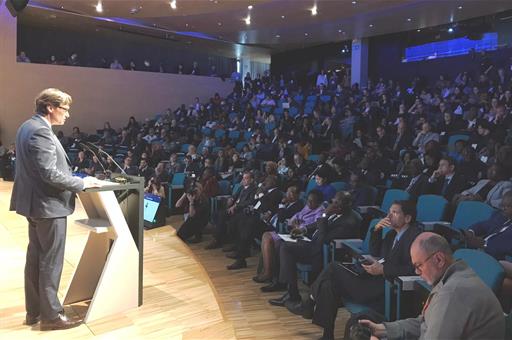Global Forum on Childhood Pneumonia
Salvador Illa confirms Spain's "strong international commitment" to universal healthcare coverage
News - 2020.1.29
The minister stressed that "this is undoubtedly one of the most important structural changes to be sought in order to reduce childhood pneumonia around the world".
Salvador Illa insisted that the health of our children represents a major future asset and highlighted the fact that more than 800,000 children under five years old die every year to pneumonia around the world, almost three times more than to other infections, such as malaria. Furthermore, he said that this disease is preventable and treatable, but "its severity greatly depends on various factors related to social development".
Exclusive breastfeeding in the first six months and proper nutrition are factors that can protect against this disease. Air quality and access to drinking water are also essential in the development of respiratory diseases. The minister went on to stress that, "of course, access to universal healthcare systems is also vital as they enable healthcare services to be provided to all communities".
Salvador Illa underlined primary healthcare as a fundamental tool for preventing pneumonia through vaccination programmes, as well as for "diagnosing and treating it quickly".
Most vulnerable groups
The Minister for Health explained that diagnosing and treating pneumonia is simple from a medical standpoint nowadays. "What is proving to be genuinely complicated is successfully bringing it to all parts of the planet and, in particular, to the most disadvantaged areas and most vulnerable populations and groups", he said.
Furthermore, he said that childhood pneumonia is unevenly spread: depending on where they are born, children are more or less likely to become sick and even die, as is the case in poorer countries. In some countries of the world, the infant mortality rate to pneumonia is 27 out of every 1,000 children.
In Spain, the mortality rate to pneumonia in children under five stands at 0.3 out of every 100,000 children "and this is heavily influenced by having a universal National Health System based on primary healthcare, which provides an international benchmark and is considered as one of the best and most efficient in Europe and indeed the world".
Significant contributions
Salvador Illa said that, as a member committed to the community of donors, Spain has been making significant development aid contributions to improve global health.
The Spanish minister stressed that Spain returned a few months ago to the community of donors to the Global Fund to Fight AIDS, Tuberculosis and Malaria, providing 100 million euros over three years. "We believe that our contribution will be able to continue growing in the years ahead", he said.
As part of the Government of Spain's commitment to the fight against social determinants of health, especially in children, the minister highlighted the creation of the High Commissioner for the Fight against Childhood Poverty. He also said that these objectives must be perfectly aligned with those set by the 2030 Agenda. "To that end, we have begun work to draw up a Global Health Strategy for the Spanish Agency for International Development Cooperation", he said.
He went on to add that "the Government of Spain also firmly supports science and biomedical research as fundamental tools for progress in this fight".
Non official translation





